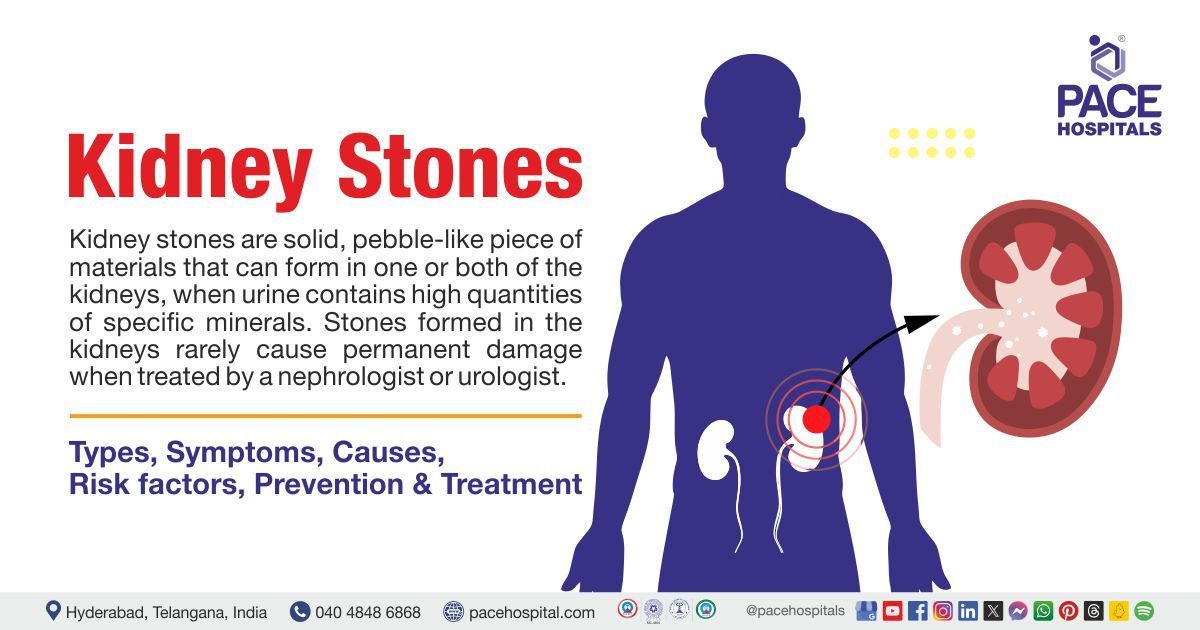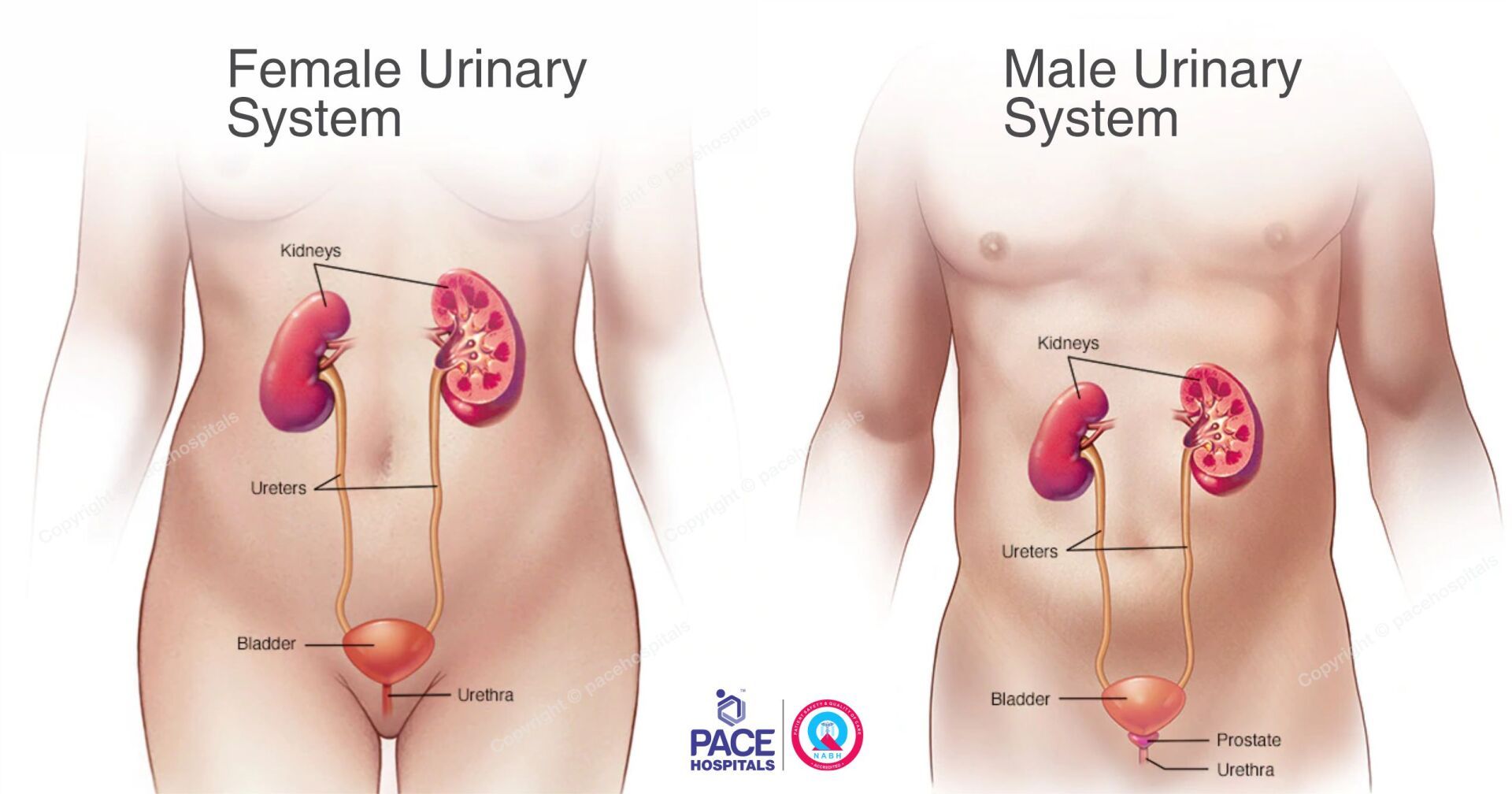Kidney Stones - Symptoms, Causes, Prevention and Treatment
PACE Hospitals
kidney stone introduction
Kidney stones, also known as renal calculi, nephrolithiasis, or urolithiasis, are deposited salt and minerals made up of calcium or uric acid. They form inside the kidney and pass through the other parts of the urinary tract. Kidney stones vary in size, and their size determines whether they are small or large.
Kidney stones form whenever minerals accumulate in the urine. If people aren’t well-hydrated, urine becomes more concentrated with increased levels of certain minerals. Whenever mineral levels increase, kidney stones can form. Depending on the size of the stones and various other factors, kidney stone treatment can be done either pharmacologically (through medicines) or surgically by a skillful nephrologist or urologist or a kidney stone specialist.
Kidney stones definition
A kidney stone is a rigid mass formed by urine substances. These substances are usually found in the urine but become highly concentrated because of insufficient liquids to flush them out of the body through the urine.
Nephrolithiasis meaning
The Kidney stones medical term is “Nephrolithiasis” which is derived from the Greek language, where nephros means ‘kidney’ and lithos means ‘stone’.
The urinary system, in both males and females, consists of the kidneys, ureters, bladder, and urethra. Kidneys filter waste and excess fluid from blood, producing urine. This urine travels through the ureters to the bladder, where it's stored until released through the urethra.
Prevalence of kidney stones
Prevalence of kidney stones worldwide
Urolithiasis affects around 12% of the world's population in certain stages in their lifetime. It affects all ages, sexes, and races but occurs more frequently in men than women within the age group of 20–49 years.
Prevalence of renal stones in India
Similar to its global prevalence, the prevalence of kidney stones in India is approximately 12%, with a relative commonality in northern India, where it stands at 15%. Various factors induce kidney stones, such as family history, age, gender, diet, comorbidities, genetics, environment, etc. This condition demonstrates higher recurrence rates irrespective of treatment.
Kidney stone composition
Kidney stones are formed due to calcium and oxalate. Kidney stones are formed from a mixture of magnesium, ammonium, phosphate, and calcium carbonate, Depending on their composition, kidney stone is either yellow or brown in color and smooth in appearance.

Types of kidney stones
There are four types of kidney stones, mainly calcium oxalate stones, which are frequently observed in patients. The formation of kidney stones varies depending on the type of stone. Types of renal stones include:
- Calcium oxalate kidney stones
- Uric acid kidney stones
- Struvite or ammonium kidney stones
- Cystine stones
Calcium oxalate kidney stones
- Calcium oxalate stones are common kidney stones formed by binding calcium with oxalate (a natural chemical found in most foods), resulting in the formation of calcium oxalate crystals, which are observed in the urine.
- Calcium oxalate stone formation occurs due to a deficiency of calcium in the body.
Uric acid kidney stones
- Uric acid stones are also one of the common types of kidney stones. Increased levels of a natural chemical called purine (a compound present in meats) in the body elevate a high level of a chemical called urate, which can form kidney stones.
- Uric acid kidney stones have a pH of less than five due to the intake of purine foods such as fish, legumes, and meat.
Struvite kidney stones or Ammonium stones or Staghorn stone
- Struvite stones, commonly known as "infection stones," occur less frequently than calcium and uric stones. These stones develop as a result of urease, a substance generated by bacteria that causes urinary tract infections.
- They are more frequent in women than men and in patients who have a urinary catheter (a tube inserted into the bladder to drain urine out). Struvite stones develop quickly, and as a result, they can get large enough to fill the kidney, known as a staghorn stone.
Cystine stones
Cystine stones are caused by an rare genetic condition called cystinuria (excessive amounts of an undissolved substance called cystine in the urine). They account for one in ten adult kidney stones and almost seven out of ten pediatric kidney stones.
Cystinuria causes a natural substance known as cystine to escape into the urine. Cystine does not dissolve quickly in urine, and excess cystine can cause kidney stones. The majority of cystinuria patients develop their first stone during childhood. They will then continue to produce countless stones throughout their lives. This disorder is treatable but cannot be cured.
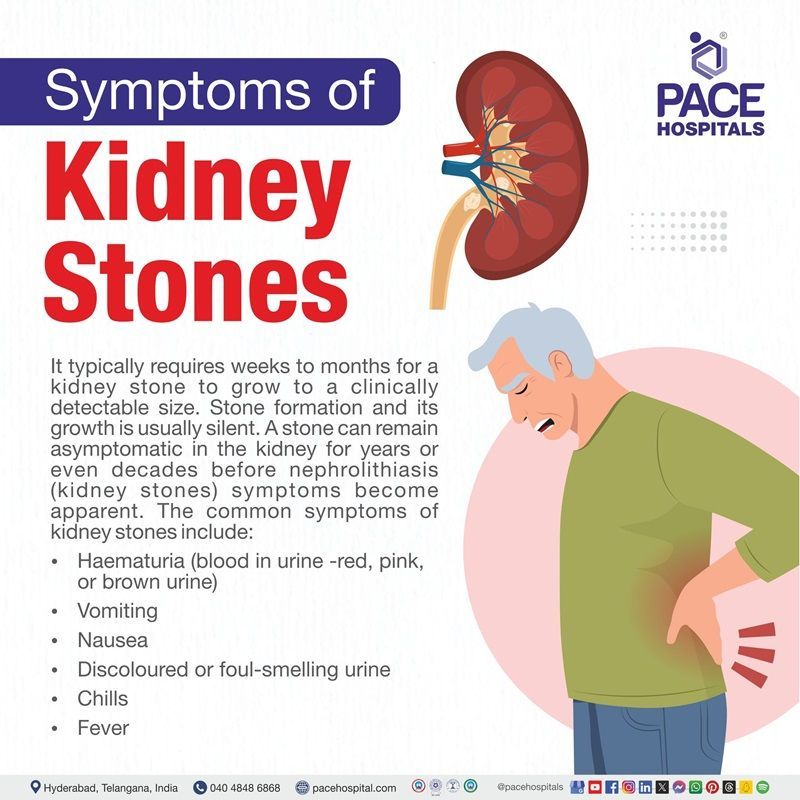
Kidney stone symptoms
It typically requires weeks to months for a kidney stone to grow to a clinically detectable size. Stone formation and its growth are usually silent. A stone can remain asymptomatic in the kidney for years or even decades before nephrolithiasis (kidney stones) symptoms become apparent. The common symptoms of kidney stones include:
- Haematuria (blood in urine - red, pink, or brown urine)
- Vomiting
- Nausea
- Discolored or foul-smelling urine
- Chills
- Fever
- Frequent need to urinate
- Urinating small amounts of urine
Kidney stone pain area
- Kidney stone pain can be felt in the belly or back near the spinal cord.
- Pain can transmit to the groin area (groin pain), testicles (testicle pain) in men, and labia (vaginal pain) in women.
Kidney stone pain
- The pain varies depending on the kidney stone's location, such as the upper pole, middle calyx, or pelvis of the kidney, the lower pole of the kidney, proximal and mid-ureteral stones, and distal ureteral stones.
- Pain from a stone can persist for a few days after a complete passage of the stone through the urine.
- The urologist may repeat the imaging tests (usually an ultrasound) if the pain persists for more than a week to find out further blockage that is present in the kidney (sometimes due to a remaining stone fragment).
Kidney stones causes
Kidney stones develop when solutes such as urea, sodium, etc crystallise (to form crystals) out of urine. This condition can be caused by anatomical abnormalities that cause urinary stasis (impaired urine outflow), low urine volume, dietary factors (for example, high oxalate or sodium), urinary tract infections, systemic acidosis (too much acid in the body’s fluids), drugs, or, in rare cases, inheritable genetic factors such as cystinuria (excessive amounts of cystine amino acid in the urine).
The majority of patients with nephrolithiasis (75%-85%) develop calcium stones, which are primarily composed of calcium oxalate (monohydrate or dihydrate) or calcium phosphate. The other major forms are uric acid (8%-10%), struvite (calcium magnesium ammonium phosphate, 7%-8%), and cystine stones (1%-2%).
Inadequate hydration and insufficient urine volume are the leading causes of kidney stone disease. The four most frequent chemical factors that contribute to kidney stone production are:
- Hypercalciuria - an excess amount of calcium in the urine
- Hyperoxaluria - increased oxalate in the urine
- Hyperuricosuria- the excretion of more than 800 mg of uric acid per day in men and more than 750 mg in women through their urine
- Hypocitraturia- excretion of less than 320 mg of citrate in the urine per day
The major causes of all four types of kidney stones include:
Calcium stones may develop due to
- Hyperparathyroidism (excess release of parathyroid hormone by parathyroid gland)
- Renal calcium leak (a condition in which the kidneys lose calcium in the urine independent of calcium levels in the blood or diet)
- Idiopathic hypercalciuria (elevated calcium in the urine due to an unknown reason)
- Hypomagnesemia (magnesium deficiency)
Uric acid stones may develop due to
- A pH of urine less than 5.5
- High purine-rich diet (fish, beans, meat)
- Cancer
- Inflammatory conditions such as gout
Struvite stones are generated by Gram-negative, urease-producing bacteria that break down urea into ammonium. Frequent organisms that can cause struvite stones include pseudomonas, proteus, and Klebsiella. However, E coli does not produce urease and is not associated with struvite stones.
Cystine stones are caused by an innate metabolic abnormality that prevents the renal tubules from reabsorbing amino acids such as cystine, lysine, ornithine, and arginine.
Apart from the above-mentioned causes, drugs that have the potency to cause kidney stones as an adverse effect may include:
- Antivirals
- Certain types of expectorants
- Antibiotics (sulphonamide class)
- Potassium-sparing diuretics
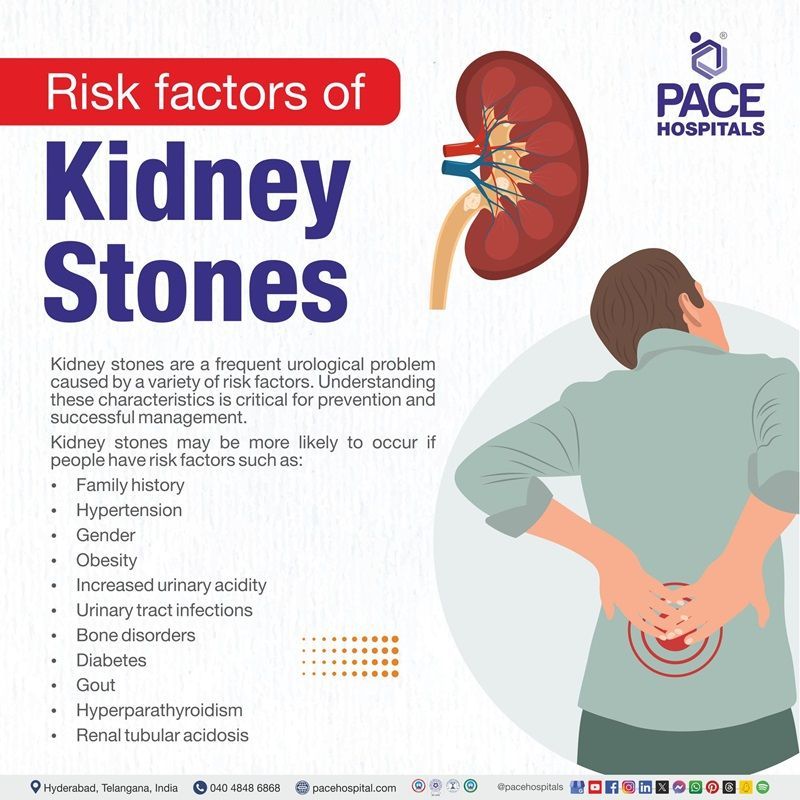
Risk factors for kidney stones
Kidney stones are a frequent urological problem caused by a variety of risk factors. Understanding these characteristics is critical for prevention and successful management.
Kidney stones may be more likely to occur if people have risk factors such as:
- Family history
- Hypertension (increased blood pressure)
- Gender
- Obesity
- Increased urinary acidity
- Urinary tract infections
- Bone disorders
- Diabetes (increased blood glucose)
- Gout (elevated levels of uric acid in knee joints)
- Hyperparathyroidism (increased levels of parathyroid hormone)
- Renal tubular acidosis (kidneys unable to remove acids from the blood into the urine)
Family history: Having a family history of kidney stones increases the chances of developing kidney stones. This is because some kidney stones are genetic, which means that they can be handed down through generations. A research study discovered that those having a family history of kidney stones had a 3.16 times higher prevalence odds ratio and a 2.57 times higher relative risk of getting kidney stones than those who did not have kidney stones disease.
Hypertension: Hypertension can increase the likelihood of developing kidney stones. A study demonstrated that hypertension patients had twice the risk of developing kidney stones than normotensive people (people with normal blood pressure). The study also indicated that the increased urine calcium excretion that is frequent in hypertension could be the link between the two conditions.
Gender: Men are more prone to develop kidney stones than women, but the rate of kidney stone formation is increasing faster in women. Indeed, current research reveals that adolescent females are more prone than earlier generations to suffer kidney stones. Men have an 11% risk of developing kidney stones, while women have a 9% risk. Women may soon have the same risk of kidney stones as males.
Obesity: Obesity increases the chance of developing kidney stones. Larger body sizes can lead to more uric acid and oxalate excretion in urine, both of which are risk factors for calcium oxalate kidney stones.
Increased urinary acidity: Increased urine acidity raises the risk of kidney stones. When the pH of urine falls below 5.5, it becomes saturated with uric acid crystals, resulting in hypercalciuria. When there is an excess of uric acid in the urine, stones may develop.
Urinary tract infections: Chronic or recurring urinary tract infections (UTIs) can increase the likelihood of developing kidney stones. Some bacteria that cause UTIs can make urine more alkaline, resulting in the production of magnesium ammonium phosphate (struvite) stones.
Bone disorders: Bone disorders release excess of calcium into the urine, a condition known as hypercalciuria. Hypercalciuria further leads to the formation of the kidney stones.
Diabetes: In type 2 diabetes mellitus, β-cell dysfunction causes a reduction in insulin secretion, resulting in insulin resistance. Among various pathophysiological effects of insulin resistance, decreased levels of ammonia are also seen, which lowers urinary pH levels. These phenomena may lead to the formation of uric acid stones.
Gout: Gout with elevated serum uric acid levels results in hyperuricosuria (increased uric acid in the urine), Which leads to the formation of uric acid stones in the kidneys.
Hyperparathyroidism: Hypercalciuria (increased calcium in the urine) is a symptom of hyperparathyroidism.
The excess calcium in the urine is due to intestinal calcium absorption and skeletal calcium mobilization. Increased hypercalciuria leads to the formation of kidney stones.
Renal tubular acidosis: Renal tubular acidosis enhances the formation of kidney stones due to increased release of calcium phosphate from the bones and increased intestinal calcium absorption. The increased calcium in the blood (hypercalcemia) leads to the formation of kidney stones.
Foods to avoid with renal stones
Certain foods can contribute to the formation of kidney stones. The process of how these foods lead to kidney stones is explained below. To help prevent kidney stones, avoid the following foods that cause kidney stone:
- Chicken
- Pork
- Organ meats
- Processed meats (meats preserved by chemicals)
- Eggs
- Fish
- Milk (high intake of milk)
- Cheese (high intake of cheese)
- Yogurt (high intake of yoghurt)
- Fast foods
- Studies demonstrate that vitamin C (ascorbic acid) supplementation increases the risk of forming kidney stones.
Chicken, pork, organ, processed meat, and eggs
- Red meat, pork, chicken, and eggs elevate uric acid levels.
- High intake of the above protein decreases the chemical in urine called citrate.
- Citrate usually prevents the formation of kidney stones. Whenever citrate levels are decreased due to a high intake of foods, it results in the formation of kidney stones.
Fish
- Fish consists of high amounts of a natural chemical compound known as purines. High purine intake leads to increased production of uric acid that causes burden to kidney to excrete such a high amount of uric acid.. There will be an increased concentration levels of uric acid, resulting in kidney stone formation.
Milk, cheese, and yoghurt
- Milk, cheese, and yoghurt are the sources of calcium.
- The recommended daily allowance (RDA) of calcium is 1,000 mg per day.
- If the calcium intake is more than the recommended level, then the calcium binds with oxalate and prevents the absorption of calcium oxalate, resulting in the development of calcium oxalate kidney stones.
Fast foods
- Fast foods contain high sodium levels, which enhance the formation of calcium stones.
High doses of vitamin C
- The National Institute of Health (NIH) recommends adults should not consume more than 2,000 mg per day
- If vitamin C is consumed by adults, more than 2000 mg per day results in kidney stone formation.
- The vitamin C is metabolised into oxalate form, then calcium binds with the oxalate and forms calcium oxalate stones in the kidney.
Kidney stone complications
If left untreated, kidney stones can create potential consequences. However, this is uncommon because the majority of kidney stones are treated before they become problematic.
Complications that arise due to untreated kidney stones include:
- Abscess formation (accumulation of pus)
- Forniceal rupture (a situation in which urine leaks outside of the renal collecting system)
- Hydronephrosis (swelling of the kidneys)
- Perinephric abscess (collection of pus in the cone-shaped compartment in the abdomen that contains kidneys, adrenal glands, etc.)
- Pyelonephritis (kidney infection)
- Pyonephrosis (kidney infection that starts with accumulation of pus in the upper collecting system and can become obstructed)
- Renal colic (discomfort that develops when a stone obstructs the urinary system)
- Kidney failure (complete loss of kidney function)
- Sepsis (a hazardous condition in which the body fails to respond appropriately to an infection)
- Urosepsis (a kind of sepsis happens when a urinary tract infection (UTI) goes untreated and progresses to the kidneys)
- Ureteral stones (stones in tubes that carry urine)
- Urinary extravasation (Urine leakage into surrounding tissues owing to a bladder or urethral wall defect)
- Urinoma (accumulation of urine that develops in the back of the abdomen.
Kidney stones in pregnancy
The presence of renal stones in pregnancy conditions leads to an increased risk of recurrent miscarriage, mild pre-eclampsia (increased hypertension during pregnancy), chronic hypertension, gestational diabetes mellitus, and caesarean deliveries.
Different sizes of kidney stones
The kidney stone size varies from less than or equal to 2mm to 4mm, and as big as 5mm – 12 mm which can be excreted on their own (through urination), surgical treatment is needed if the stone size is more than 10 mm.
Kidney stone diagnosis
The process of diagnosing kidney stones consists of various parts. The urologist reviews the medical history, conduct a physical examination, and order imaging tests.
Medical history: The urologist/urogynecologist will inquire about any medical illnesses or risk factors that could lead to kidney stone formation. These may include dehydration, family history, specific foods, and underlying medical issues.
Physical examination: The urologist will look for indicators of kidney stones, such as abdominal or lower back pain, blood in the urine, and trouble urinating.
Imaging tests
- Kidney stone sonography (Ultrasound)
- MRI scan of the abdomen and kidneys
- Abdominal computed tomography (CT) scan
- Abdominal X-rays
Lab test for kidney stones
- Blood test
- Urine test
Kidney stones treatment
The majority of kidney stones can be treated without surgery. Most stones will pass on their own in three to six weeks. If a stone does not pass and obstructs urine flow, or causes bleeding or infection, it may need to be removed. Treatment for kidney stones is based on their size, location, and the symptoms they produce. Here are some popular kidney stone treatment options:
- Pharmacological therapy
- Surgical procedures (Kidney stone operation)
Pharmacological therapy (kidney stone medicine)
Pharmacological therapy for kidney stones is frequently used to relieve discomfort, help stone passage, and prevent recurrence. kidney stone medications to tackle the symptoms include:
- Nonsteroidal anti-inflammatory drugs (NSAIDs)
- Opioids
Surgical procedures (kidney stone surgery)
There are mainly four types of non-invasive techniques and surgery that are performed according to the size and location of the renal stone:
- Kidney stone laser treatment also termed laser lithotripsy
- Retrograde Intrarenal Surgery (RIRS)
- Ureterorenoscopic Lithotripsy (URSL) with Holmium Laser
- Extracorporeal shock wave lithotripsy (ESWL)
- Percutaneous Nephrostolithotomy (PCNL) Procedure
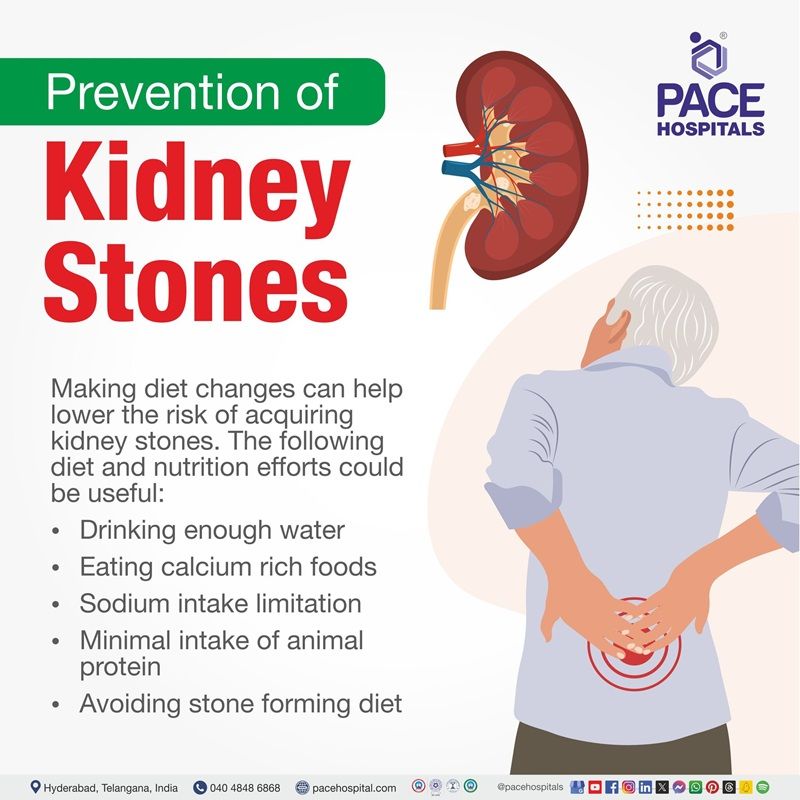
Kidney stone prevention
Making diet changes can help lower the risk of kidney stones development. The following diet and nutrition efforts could be useful for nephrolithiasis prevention:
- Drinking enough water
- Eating calcium-rich foods
- Sodium intake limitation
- Minimal intake of animal protein
- Avoiding stone-forming diet
Drinking enough water: Drinking more water dilutes the chemicals in urine that cause stones. Drinking enough fluids helps one to pass 2 litres of urine every day. It may be beneficial to include citrus beverages such as lemonade and orange juice. The citrate in these beverages helps prevent stone development.
Eating calcium rich foods: Including calcium in the diet may help to decrease the amount of oxalate by binding to it in the intestines. This binding of calcium to oxalate decreases the absorption of oxalate into the blood stream and oxalate, eventually gets excreted by the kidneys. This phenomenon lowers oxalate concentration in the urine, making it less likely to bind with the urinary calcium. This may reduce the risk of kidney stone formation.
Sodium intake limitation: A diet rich in sodium may induce kidney stones because excess sodium may increase the amount of calcium in the urine. So, it is recommended to use sodium in the limit to tackle the triggering of kidney stones. Guidelines currently suggest 2300 mg (milligrams) of sodium intake daily. If kidney stones have previously been caused by sodium, it is advised to limit the daily intake to 1,500 mg. Sodium limitation may also help to manage high blood pressure and heart diseases.
Minimal intake of animal protein: Consuming excessive amounts of animal protein, which includes red meat, poultry, eggs, and seafood, has been associated with an increased risk of kidney stones. If people have a tendency to develop stones, it is suggested not to eat more meat every day.
Avoiding stone-forming diet: People who are prone to calcium oxalate stones should limit oxalate-rich foods such as beets, chocolate, spinach, rhubarb, tea and nuts. The excess oxalate is eliminated in the urine, where it may mix with urinary calcium.
According to many research studies, people who use large dosages of vitamin C supplements are somewhat more likely to develop stones in the kidneys. That could be because the body can convert vitamin C to oxalate.
Difference between gallstones and kidney stones
Gallstones vs Kidney stones
Both kidney and
gallstones are frequent medical problems that can result in pain and the formation of tiny stones. However, they have different causes, symptoms, diagnostic procedures, and therapies.
| Aspect | Gallstones | Kidney stones |
|---|---|---|
| Location | Gallbladder | Kidneys |
| Composition | Cholesterol, bilirubin, and bile salts | Calcium, oxalate, uric acid, and other minerals |
| Causes | Excess cholesterol, bilirubin, or bile salts | High levels of certain substances in urine |
| Symptoms | Abdominal pain, nausea, vomiting, jaundice | Severe back or side pain, hematuria (blood in urine), nausea |
| Diagnosis | Ultrasound, CT scan, MRI | Ultrasound, CT scan, X-ray |
| Treatment | Medication, surgery (cholecystectomy) | Medication, lithotripsy, surgery (ureteroscopy) |
| Prevention | Healthy diet, maintaining a healthy weight | Staying hydrated, dietary changes |
Frequently Asked Questions (FAQs) on Kidney Stones
Can protein powder cause kidney stones?
Yes, consuming too much protein powder can raise the risk of kidney stones. Protein may elevate the body's acid load, which in turn increases calcium excretion in the urine, which is a risk factor for kidney stones. According to some research, a high-protein, low-carbohydrate diet can increase the incidence of kidney stones.
How to remove kidney stones?
The kidney stone removal process depends on the stone's size, location, and composition of the size; based on all these things, a suitable method is applied to remove the stone. If the stones don't pass out of the body on their own, they could be broken up with ultrasound shock waves or removed by a minor surgical procedure.
What are the first signs of kidney stones?
The following are the first signs of kidney stones.
- Pain in the back, belly, or side
- Pain or burning during urination.
- Blood in the urine
Are kidney stones dangerous?
The size of kidney stones determines the danger it poses. The kidney stone size varies between 5 and 10 millimetres, are passed out of the body. The smaller kidney stones are easily passed out through the urine after one or two weeks.
A large stone may obstruct the urinary system, blocking the passage of urine and leading to strong pain. Kidney stones can cause permanent kidney damage. Stones will also increase the risk of urinary and kidney infection, which results in the spread of bacterial infection into the bloodstream.
How to stop kidney stone pain immediately?
Kidney stone pain cannot be decreased immediately. Pharmacological treatment may take a few minutes to reduce the pain.
- According to consensus-based guidelines on a meta-analysis of randomized controlled trials, nonsteroidal anti-inflammatory drugs (NSAIDs) are preferred as a first line of therapy in the treatment of kidney stones.
- According to consensus-based guidelines on meta-analysis of randomized controlled trials
- Alpha blockers are also considered as the first choice of therapy in patients with kidney stones.
Can tomatoes cause kidney stones?
- No, eating tomatoes will not cause kidney stones, in fact tomatoes helps prevent the formation of kidney stones because tomatoes are rich in vitamin C because of the high levels of vitamin C in tomatoes, which prevents kidney stone formation.
- Tomatoes are a source of lycopene, beta carotene/vitamin A, vitamin C, potassium, and fiber.
How to remove kidney stones without surgery?
Patients who previously had significant surgery to remove their stones might now be treated with lithotripsy, which requires no incisions whatsoever. As a result, lithotripsy is the sole non-invasive treatment for kidney stones, which means no incision or internal telescopic device is needed.
Do citrus fruits help in kidney stone removal?
No, citrus fruits will not remove kidney stones, but citrus fruits prevent the formation of kidney stones because citrus fruits such as lemon and lime are high in citrate, which prevents kidney stone formation. Citrus fruits are effective in preventing calcium oxalate stone formation in the kidney.
- Preventing stone formation: It can bind with calcium in urine, reducing the risk of new stone formation.
- Preventing stone enlargement: It binds with calcium oxalate crystals, preventing them from becoming larger and enhancing the process of passing the crystals before they become larger.
Is milk good for kidney stones?
Yes, since calcium oxalate is the most frequent type of kidney stone, there is a common misunderstanding that consuming too much calcium increases the chance of getting kidney stones. In reality, eating foods high in dietary calcium, such as milk, yoghurt, cheese, fortified milk substitutes, white beans, tahini, almonds, and chia seeds, will reduce the chance of getting kidney stones. Dietary calcium binds to oxalate before it reaches the kidneys, which helps prevent kidney stones.
Can a 7mm kidney stone dissolve?
Yes, a 7 mm kidney stone can dissolve because most of the kidney stones with a diameter of fewer than 5 millimetres, and approximately half of all the stones between 5 and 10 millimetres, are passed out of the body. Smaller kidney stones are easily passed out through the urine after one or two weeks.
How long does it take to pass a kidney stone?
The time required to pass the kidney stone varies depending on its size. Generally, small stones can be excreted through the urine within 1-2 weeks without treatment. If the stone size is larger than 10 mm, it may require 2-3 weeks to pass through the kidneys and into the bladder.
What is the difference between kidney pain and back pain?
Back pain affects the middle of the spine and is mostly seen in lower back pain. Spine-related problems are the major cause of back pain; in some conditions, pain radiates down towards the legs. In comparison, kidney pain is located on the back, either to the right or left of the spine, and it is usually deeper. Usually, kidney pain symptoms occur under the ribs. Kidney pain may also radiate to other anatomical areas, such as the abdomen.
How are kidney stones formed?
The low intake of fluid will increase the production of concentrated urine, resulting in supersaturation.
The supersaturation (concentration of a product exceeds the solubility product) enhances the solutes precipitate in urine, leads to the formation of the nucleation (formation of a nucleus) and subsequently forming crystals.
Share on
Request an appointment
Fill in the appointment form or call us instantly to book a confirmed appointment with our super specialist at 04048486868
Appointment request - health articles
Recent Articles


